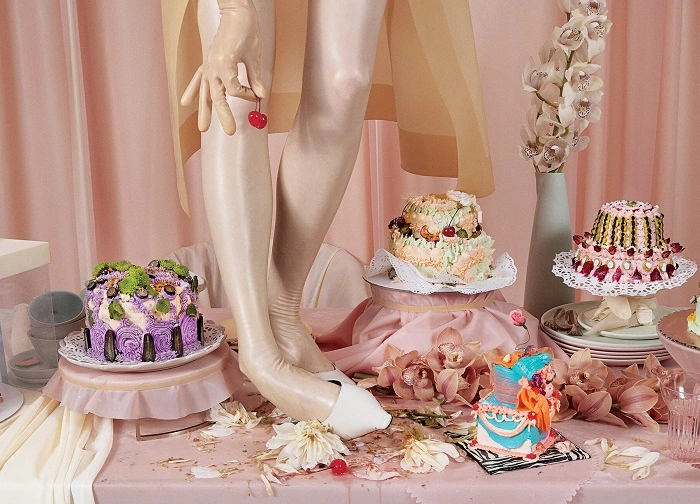In the ever-expanding world of shock value and viral content, one bizarre trend has stirred up more than its fair share of outrage, confusion, and morbid curiosity—the Amy Winehouse corpse cake. Yes, it’s exactly what it sounds like: a cake designed to resemble the late singer Amy Winehouse, not in her glamorous prime, but in a disturbingly lifeless state.
What Is the Amy Winehouse Corpse Cake?

The “Amy Winehouse corpse cake” refers to a hyper-realistic cake crafted in the likeness of Amy Winehouse, but not in a celebratory or tribute-style way. Instead, the cake portrays her as a lifeless figure—complete with disheveled makeup, pale skin, and a haunting expression.
Designed by an independent artist or bakery (depending on the viral source), the cake appears to have been created for shock value or perhaps as a statement on celebrity culture. It rapidly spread across Twitter, TikTok, and Reddit, where people were equal parts horrified and fascinated.
Why Did It Go Viral?
The internet thrives on extremes—whether it’s something hilariously wholesome or chillingly grotesque. The Amy Winehouse corpse cake went viral because:
- It pushed boundaries of what’s acceptable in food art
- It featured a well-known and beloved celebrity
- It sparked ethical debates around death, art, and public figures
- People love to share the bizarre and unbelievable
It wasn’t just the visual that disturbed people—it was the idea of slicing and eating something that looked like a recently deceased person, especially someone as tragic and iconic as Amy.
The Backlash
As expected, the backlash came swiftly.
Fans of Amy Winehouse called the cake “disrespectful,” “morbid,” and “tone-deaf.” Many expressed that it dishonored her legacy, particularly given the struggles she faced during her life with addiction and mental health.
Several commenters noted:
- “This is not art. It’s trauma wrapped in fondant.”
- “Who wakes up and decides, ‘Let me turn a dead singer into dessert?’”
- “Amy deserves better.”
The outrage wasn’t limited to fans. Even neutral viewers were stunned that anyone would think such a cake was a good idea—especially when it was posted with no clear context or purpose.
The Defense: “It’s Just Cake Art”
Of course, not everyone saw it as offensive.
Some people defended the cake as a form of extreme cake art—pointing to a growing trend of hyper-realistic cakes that blur the line between dessert and sculpture. Others argued that art should be allowed to challenge societal norms and provoke uncomfortable conversations.
A few supporters claimed:
- “You don’t have to like it, but it’s still art.”
- “Death is part of life. This is commentary.”
- “Amy would have laughed at it.” (a statement that many fans disputed)
Still, the general consensus online leaned heavily toward disapproval.
The Trend of Morbid Cakes

Believe it or not, this isn’t the first time something like this has happened.
In the last few years, the cake world has seen:
- Realistic heart cakes (complete with veins and arteries)
- Decapitated Barbie cakes
- Corpse bride cakes for Halloween
- “Cannibalism” cakes where guests cut into realistic human limbs
These designs, while unsettling, are often celebrated in horror-themed events or Halloween parties. The difference with the Amy Winehouse cake? It depicted a real person who died tragically, not a fictional or abstract concept.
The Ethical Question: Where’s the Line?
This cake raises a bigger question: Where is the line between artistic expression and poor taste?
Especially when dealing with the likeness of a real person—someone with a grieving family, a legacy of music, and millions of devoted fans—it’s crucial to consider intent and impact.
Was it satire? Was it a dark tribute? Or was it just a shock for the sake of attention?
In the age of clickbait and viral visuals, morality often becomes a grey area.
Amy Winehouse’s Legacy Deserves Better
Amy Winehouse wasn’t just a celebrity. She was a musical genius, a tortured soul, and a symbol of both talent and tragedy. Her death in 2011 shook the world, and her music still touches lives today.
Creating a dessert based on her corpse arguably trivializes her struggles and reopens wounds for those who admired or loved her.
There are plenty of creative ways to honor a celebrity—through murals, tribute cakes, performances, or donations to mental health charities. Turning them into a grotesque novelty feels more like exploitation than appreciation.
The Amy Winehouse corpse cake is one of those internet oddities that sparks deeper conversation about art, respect, and the culture of shock. While some see it as a bold statement or even a work of edible craftsmanship, many more view it as an offensive, tasteless misstep.
In a world where anything can go viral, creators have more responsibility than ever to consider not just what will get attention—but at what cost.

